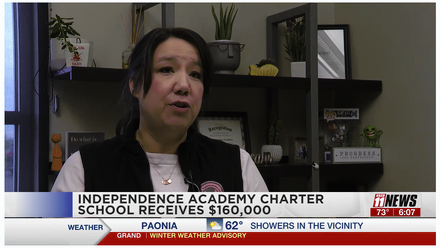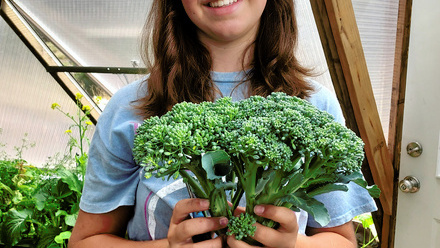From Farm to Fork: Charters go Local One Bite at a Time
By Kim Daly
The program, which awarded a total of $500,000, is empowering schools like Pinnacle to upgrade their school meals. The funds “helped us to increase our capacity to purchase raw food products from local producers and improve the nutritional quality of the food offered," says Kelley Dillon, Nutrition Services Director at Pinnacle Charter School.
This translates to exciting changes on students' plates.
With their $9,100 portion of the grant, Pinnacle has purchased produce, including peaches, apples, plums, bell peppers, cucumbers, cilantro, melons, tomatoes, and onions. They’ve also added quinoa to their menu. In August, yellow and zucchini squashes — their local food of the month — inspired a new meal: Calabacitas, a Mexican dish that combines squash with peppers, corn, and tomatoes.
At The Academy, Andrea Foust, Director of Finance, says rose radishes are a thing. It’s just one way that their $8,700 in funds and fresh food is inspiring them to make displays more appealing to students.
Procuring raw products from local producers not only helps to integrate more scratch cooking, it also ensures the cafeteria food served is high quality and nutritionally dense, says Dillon. This is especially critical for schools with a high percentage of free and reduced lunch, where food insecurity is common. “The nutrition service department at the school is often the primary resource students have to eat food during the day,” says Dillon.
Beyond Health
While purchasing local food boosts nutrition and student development, it also serves as a motivator, educational opportunity and connection point. Pinnacle makes a point to share nutritional values and agricultural practices with students, both in the cafeteria and the classroom. In addition to helping them better understand the value of these foods, it connects students to the community around them and the foods that can grow there.
In Northern Colorado, recipient CECFC once hosted a 100% local meal on Colorado Proud School Meal Day. Having already built partnerships with six local farmers and ranchers, they “hope that in the current school year, locally sourced foods not only provide elevated flavor and color to our school lunches, but also help our students and staff understand from where and from whom their food is grown,” shares Kristin Maxwell, the school’s interim Farm to School Coordinator. CECFC received just over $2,600 from the grant towards that goal.
Food Hubs
The STEAD School in Commerce City strives to spend their dollars with producers located within a short radius of the campus, including farms in Boulder County, Adams County, Denver and Brighton. A few act as both growers and aggregators of local products. Partnerships with these so-called food hubs are one way to connect producers with schools like The STEAD School which has $1,000 to spend thanks to the grant.
At Pinnacle, Dillon says this approach has been the most effective way to procure local food products from multiple farmers and producers. “Food hubs aggregate products from many different local farmers,” explains Dillon. “In doing so, they help to establish local and regional food systems and increase farmer access to larger markets, such as schools.”
Currently, her team is working with Colo-Pac and the East Denver Food Hub to source products, two relationships that she hopes will connect her to even more farmers, ranchers, and producers.
“Students and staff benefit from access to local, fresh and healthy food grown locally,” says Dain Holland, Farm & Food Manager at The STEAD School. “And our community benefits by keeping those dollars spent for food in our local community so those growers can continue their work.”
As its name suggests, the intent of the LFP is to encourage local purchases and off-set the cost of Colorado grown, raised, processed, and value-added products. The amount of funding that sponsors receive is dependent upon the number of school lunches provided during the 2023-24 school year multiplied by a minimum of $0.05, or a minimum of $1,000, whichever is greater. Learn more about the CDE’s local food program and how your school may benefit.






